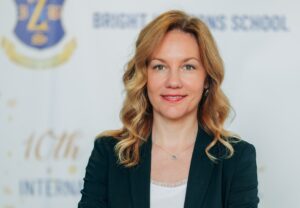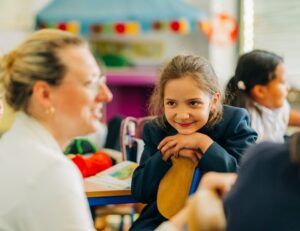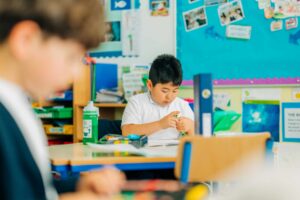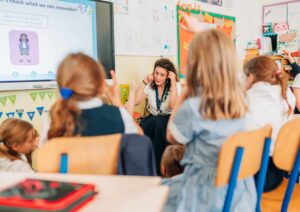Milena Prodanić Tišma, today is one of the few women, if not the only one in Croatia, who is the owner of the foreign primary and secondary school Bright Horizons International British School of Zagreb and Kindergarten Horizon. In addition, she is the only one from this region who is a Co-Opted Member of COBIS Bord. For Diplomacy&Commerce magazine, Women in Business, she reveals her path to success, the importance of education, but also the environment in which we grow up and how important it is in both personal and business development.

- According to official data, about 5% of women are in management positions in large companies in Croatia. There are many of them in education, but not as school owners. How difficult is it to be where you are today? How was your business journey?
In Croatia, there is generally no long-running tradition of private education. This is one of the reasons why we don’t have many women or men who have ownership positions within education. Apart from the founders of preschool or high school institutions, where we had many ladies who managed to open kindergartens or high schools, we didn’t have so many private, primary schools in Croatia. I am happy to see that this is slowly changing and I think that the private education system is something that will be more present in the future of education in this country, especially in Zagreb, its capital city. I opened my first kindergarten almost 20 years ago. Now when I look back, I would say that it was a journey where I witnessed a lot of changes with respect to private education. We have always strived to be adaptable and to be able to respond to the needs of potential families and students, and also to continue to evaluate the curriculum and approach that we provide.

- In your opinion, what is the future of education?
I believe that university education in the future will offer more programmes that are not introduced yet to be able to respond to the needs of the changing world of employment. I also believe that Primary and secondary education will be also transformed into more and more skilled-based learning whose core should be critical thinking. New generations have easy access to so much information online and they need to be equipped to distinguish right from wrong, true from false. We can witness that students are adapting faster to these changes in the school curriculum and this is one of the demands of the governments and education sectors to address these challenges.
- How much is education necessary for success, awards, and recognition and how much does it direct or distract us from the goal that is ultimately seen as what you want?
I believe that education is essential for your journey in the world of employment. I also think that it’s important to continuously modernize education to respond to the needs for future employment opportunities. It is very important to include skill-based learning in education which, together with knowledge that students gain, prepares them to be adaptable and candidates who are well-equipped for this ever-changing world.

- How much does the environment, society, or something else influence women to be independent?
In many societies today we can see examples of women not having the freedom of speech and even some of them are not in the position to continue their education so, of course, society is one of the factors that can influence women to be or not be independent. We can also see examples when the young women had the right support system, to use all the opportunities and they still missed the chance to follow up with their ideas, and also examples that a lot of women had many struggles and later managed to fulfill their dreams and become what they always wanted for themselves.
- You are the Head and Owner of Bright Horizons International British School Zagreb and Kindergarten Horizons. What are the highlights of your approach towards education?
The highlights of education for our schools and kindergarten are that students have a chance to grow and learn in a multicultural environment where we celebrate diversity and have many opportunities to practice and gain skills that will help them to be future citizens of the world. The holistic approach to education that we are taking is putting the students and their needs at the center of the educational process where we make sure that they grow not only in an academic sense but also emotionally and socially, with a great support system for different talents students may have. We deeply understand their needs to express their creativity and be bold in different sports, and we always provide necessary support and guidance with all of their obligations.

- At the invitation of the director of COBIS, the Council of British International Schools, You were appointed as a member of the executive committee, whose seat is in London. Explain to us what COBIS is? What can you tell us about your role?
COBIS (the Council of British International Schools) is the largest, premier, global association for British schools overseas, committed to school improvement, safeguarding, and supporting its members. COBIS schools educate over 200,000 students, employ more than 17,000 teachers, and can be found in more than 80 countries across Europe, Asia, Africa, the Middle East, and the Americas. COBIS was founded more than 30 years ago and is governed by an elected board consisting of head teachers and governors from member schools worldwide. COBIS’ mission is to support and empower all British international schools in their provision of high-quality education. Its vision is to reach and connect all British international school communities in order to support them in developing students who have a positive impact on society. The guiding principles of COBIS are inclusivity, collaboration, and ambition.
I was honoured and delighted to be a co-opted member of the board, and also to join the COBIS Safeguarding & DEIJB Committee and the Membership, Growth, and Engagement Committee. This gives me the opportunity to work and to collaborate with many experienced and skilled colleagues in the world of British education, and to share my ideas and experience within these important sectors of the COBIS Board. Being the only COBIS school in Croatia, this is a great opportunity for us to be connected to such a valuable source of information and support and to have an open channel for communication with our central office in London.
- Why Should Parents Choose a British Curriculum?
Through the British curriculum, teachers create many opportunities to allow students to think critically and creatively while also fostering analytical thinking through problem-solving. Since the beginning, the British curriculum has been one of the most widely-sought education programs in the world with its well-balanced and student-centric system dedicated to helping children master any subject. At Bright Horizons, we also offer IPC (International Primary Curriculum) which aligns with the British national curriculum until Year 6, and Cambridge international education curriculum for secondary school. At Bright Horizons, we believe that every student must be valued as an individual, and our vision is to help our students develop self-confidence, self-worth, and happiness within an atmosphere of encouragement and support. Secondary students are also introduced to Global prospective subject which encourage learners to think about and explore solutions to significant global issues. It develops learners’ abilities to consider significant global issues from different perspectives and motivates learners to work collaboratively and individually as they apply their knowledge in different contexts.